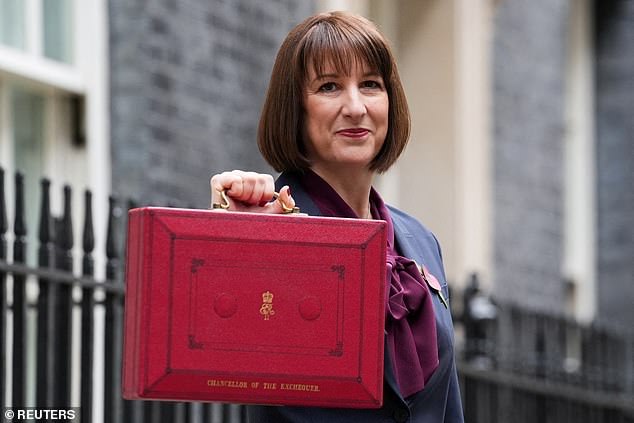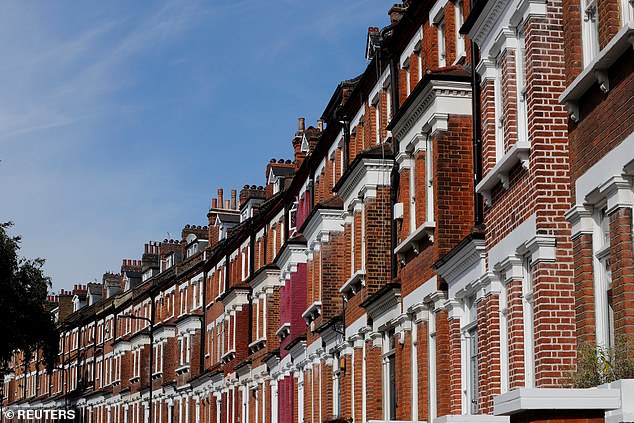Homes worth as little as £135,000 could be tested for a new ‘mansion tax’, which the Chancellor is expected to roll out next Wednesday, we can reveal.
Rachel Reeves is said to be planning a new levy on hundreds of thousands of homes in the Budget on November 26.
But it is not just the largest and most expensive homes in Britain that will be investigated under the plans.
Millions of middle-class families may be surprised to find their homes could come under scrutiny in the rollout of the new levy.
Any property that is currently classed as Band F or above for council tax – one in ten homes in England – would be revalued under the plans.
Of these, it is thought that 300,000 of the most valuable properties across these three tax bands – F, G and H – would then be stung by an extra charge on top of their existing council tax bills.

Budget raid: Chancellor Rachel Reeves (pictured) is said to be planning a new levy on hundreds of thousands of homes in the Budget on November 26
This money would go directly to HMRC, raising revenue for the Government. It is likely that those above a certain value, for example £1.5 million or £2 million, would be charged.
However, the Treasury has offered no details on exactly which homes would be affected, leaving 2.4 million families with homes in the three bands facing uncertainty.
These families face receiving slapdash valuations on their homes or probing questions about any home improvements or extensions they have made to determine their value, experts say.
Far from targeting just the wealthiest in Britain, as the term ‘mansion tax’ suggests, some of the homes that are in Band F are worth as little as £135,000, according to research for Money Mail by analytics firm PropertyData.
There is an ‘astonishing’ variation in the value of houses that are listed as Band F, with others worth more than £2.5 million, says Michael Dent, of PropertyData.
He adds: ‘If Rachel Reeves targets all Band F properties in her hastily assembled tax rise, it could lead to the unfair situation where modest Band F properties in northern England face revaluation and a potential surcharge, while million-pound Band E properties in London do not.’
Council tax bands were established in 1991 when every property in England and Wales was valued and put in one of eight bands.
However, homes have not since been revalued on a national scale. Since 1991, the value of homes have increased at varying rates, yet homes are still liable for council tax against their previous values.
Properties worth between £120,001 and £160,000 in 1991 were classed as Band F.
But differing regional house price booms have meant that houses in London that were identified as Band F 30 years ago are now worth far more than many houses in the North that would have been worth the same amount at the time.
Mr Dent says: ‘You will have some houses that have been modernised and extended that are today worth a lot more than others that have been left untouched and exactly as they were in 1991, yet they are charged the same rate of council tax – which is unfair.’
Analysis from Mr Dent, using house sales data from the Land Registry, has found that one home in Manchester and another in Solihull, West Midlands, are valued at just £135,000, despite both being classed as Band F properties.
Other Band F homes in Birmingham and Nottingham are similarly valued at less than £150,000.
At the other end of the scale, one of the most expensive homes in Band F is worth £2.9 million and located in north London.
However, multi-million-pound homes in Band E would escape the mansion tax, Mr Dent warns.
One home in Worcester valued at £2.9 million today would evade the new levy, for example. Another in Arsenal, in north London, worth £2.1 million would similarly not be liable.
‘Band E homes in London worth £2 million would escape revaluation if the Chancellor focuses on Bands F, G and H as expected.
Meanwhile, properties worth as little as £150,000 within the three targeted bands will be forced to be revalued,’ says Mr Dent.

Targets: Any property that is currently classed as Band F or above for council tax would be revalued under the plans
How would it work?
A revaluation of 2.4 million homes in the three tax bands would be a ‘big logistical challenge’ for the Government but it is not inconceivable, says Mr Dent.
Homes that haven’t changed hands in the past 15 years would be particularly difficult to revalue today.
The Treasury has not offered any indication of what criteria it would use to estimate house price values.
Mr Dent expects that the Government would run the revaluations itself. However, this could prompt a wave of challenges, where homeowners believe their house has been wrongly valued.
Mr Dent says: ‘This is why they are talking about only revaluing homes in bands F, G and H. There are sensible arguments for moving towards a system where homes are regularly revalued.
But if implemented badly and in too much of a rush without careful planning, it could be a disaster that doesn’t raise much money and creates a huge administrative burden.’
From 2028, properties in Wales will be revalued every five years to keep an up-to-date record and ensure people are paying the correct amount of council tax. There are no formal plans to do this in England.
Mr Dent says: ‘If the Government revalues homes in Band F, G and H, I would expect that to be rolled out incrementally to lower bands.’
It is unclear what would happen where a home is found to be worth significantly more or less than the average property in that band. Mr Dent says there is no indication that the band would be updated.
However, homeowners may be able to challenge their tax band and could end up paying less in council tax if they move to a lower band.
Richard Donnell, executive director of research at property group Zoopla, says some commentators have raised the idea of doubling council tax for all homes in the top two bands (G and H) in a move that would raise £4 billion for the Treasury.
However, he says it is a lot more realistic for the Chancellor to raise £600 million a year under a mansion tax that would hit 10 per cent of homes in bands F, G and H. This would mainly affect London and the South-East.
He says: ‘This would be up to a 10 per cent rise for these higher-band properties and packaged politically as ‘higher-value homes paying more tax’.’
Almost a third of the properties in bands F, G and H that would be hit by a new levy are flats, according to estate agency Hamptons.
Apartments in new-build blocks and three or four-bedroom properties in converted townhouses or older buildings are the most likely to be hit.
According to Hamptons, the average extra bill could be about £2,000 more a year.
Laith Khalaf, head of investment analysis at stockbroker AJ Bell, says the policy would cause fears that a future Government may increase the scope of a mansion tax levy.

Outdated: Houses in London that were identified as Band F 30 years ago are now worth far more than many houses in the North that would have been worth the same amount at the time
He says: ‘Even if such a ‘mansion tax’ is targeted at higher-value homes, it would naturally cause people on middle incomes to worry that it was just the thin end of the wedge, and the next time the Government needs a bit of money they could just lower the threshold.
Property taxes in particular are highly emotive and likely to elicit a strong reaction among voters if they are seen to be rising.’
Johan Svanstrom, chief executive of property group Rightmove, warns that taxing even just the wealthiest could have widespread repercussions on the entire property market.
He says: ‘As our data shows, a proposed mansion tax would only affect a small proportion of the market.
‘However, the Government needs to be cautious over the cumulative effect of taxation on higher priced areas of the country as it simply risks stalling this part of the market, since the importance of mobility for people and the overall economy is strong in those areas, too.
‘A slower market can affect all types of movers, from first-time buyers to key workers and families, even if a tax is aimed at higher-value properties.’
‘Our small three-bed home is not a mansion’
David Edwards, 72, is horrified to think that his ‘small’ three-bedroom house in Greater Manchester could even be a contender for a new mansion tax.
David, a retired property expert, had the home he and his wife have lived in for 25 years revalued at £400,000 last year – double the price they bought it for.
But because it is in Band F, it may need to be tested to prove he shouldn’t pay a mansion tax.
He says: ‘There’s no chicken coop, stable or swimming pool here. Our small three- bedroom house is definitely not a mansion. We are not sitting on piles of wealth; we are pensioners with a modest income.’


